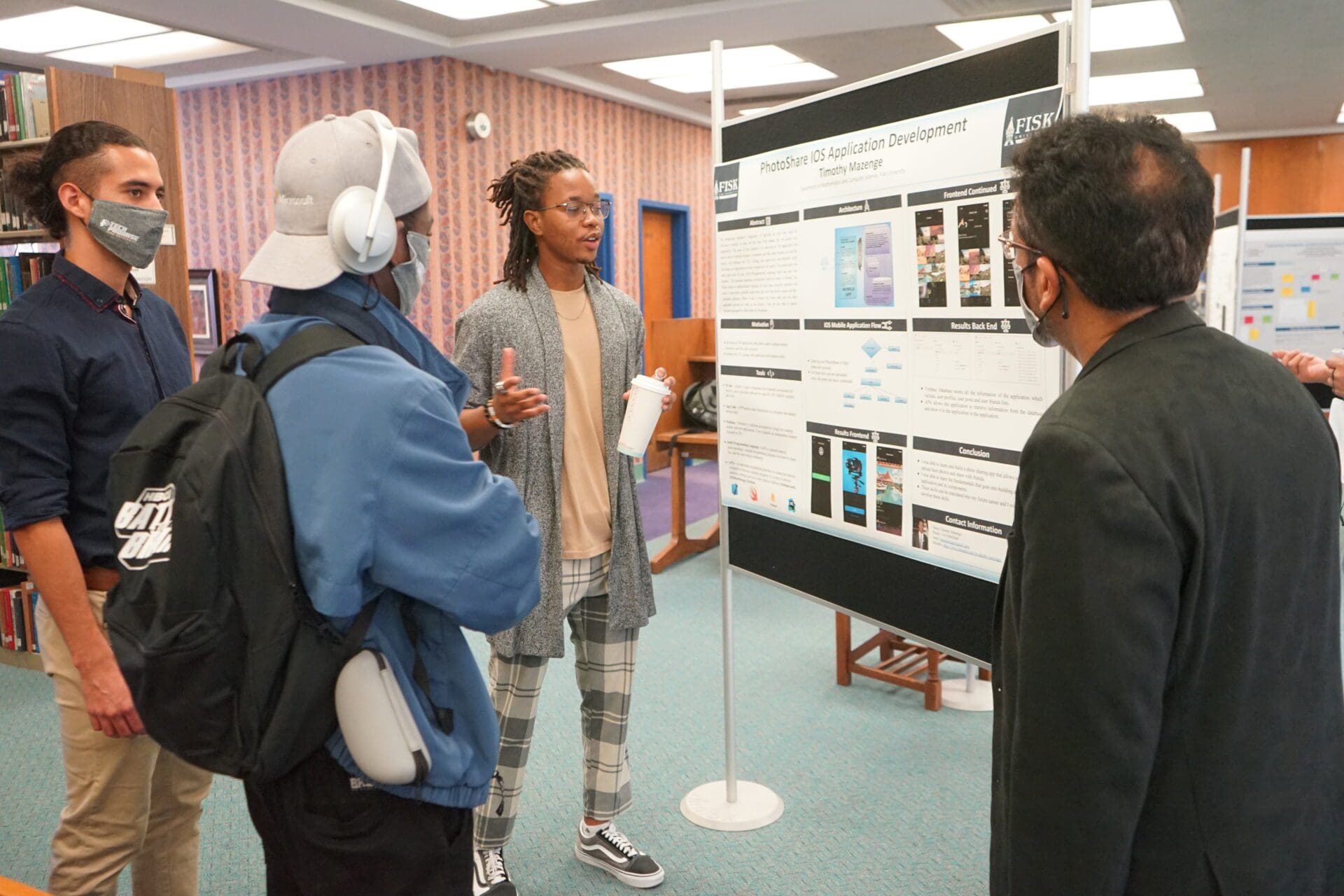University Events

- This event has passed.
23rd annual Fisk research symposium
April 5, 2023 @ 9:00 am - 5:30 pm

Wednesday, April 5, 2023
- 9:00 am – 12:00 pm – Morning Poster/Oral Presentations (Library)
- 12:00 pm – 1:00 pm Lunch Break
- 1:00 pm – 4:00 pm – Afternoon Poster/Oral Presentations (Library)
- 4:00 pm – 5:30 pm – Plenary Panel – AI & Ethics (Appleton Room, Jubilee Hall) – details are given below
—–
Session title: Addressing Health Equity Through Artificial Intelligence (AI) and Machine Learning (ML): Real or Hype?
Session format: A roundtable discussion
Session Time/Day: April 5, 2023, 4:00 pm -5:30 pm CST
Session Place: Appleton Room, Jubilee Hall
Session Speakers/Panelists:
- Rachele Hendricks-Sturrup, DHSc, MSc, MA; National Alliance Against Disparities in Patient Health, Chief Data Governance Officer; AIM-AHEAD Co-Investigator; AIM-AHEAD Ethics and Equity Workgroup Co-Chair (moderator)
- Benjamin Collins, MD, MA; Vanderbilt University Medical Center Physician and Postdoctoral Fellow in Ethics, Legal, and Social Issues of Artificial Intelligence in Healthcare; AIM-AHEAD Co-Investigator; AIM-AHEAD Ethics and Equity Workgroup member (panelist)
- Ellen Clayton, MD, JD; Vanderbuilt University Craig-Weaver Professor of Pediatrics; Professor of Law; Professor of Health Policy; AIM-AHEAD Co-Investigator; AIM-AHEAD Ethics and Equity Workgroup member (panelist)
- Lauren Edgar, DNP, RN, MSN-Ed.,FNP; AIM-AHEAD Leadership Fellow (panelist)
- Monique McCallister, PhD, MS; Tennessee State University Assistant Professor of Biological Sciences; AIM-AHEAD Leadership Fellow (panelist)
Session description:
Artificial intelligence and machine learning (AI/ML) involves the use of computer systems to model human cognitive functions like supervised and unsupervised learning and problem-solving. Today, AI/ML tools and devices are deeply embedded within our day-to-day health infrastructure, such as electronic medical records, diagnostic devices, and other tools used across health care and research settings. Also, technological advancements across a multitude of data sources have enabled the capture and continuous and precise analysis of sociodemographic factors, health behavior, disease, biomarkers, and other critical variables of health-relevance. Yet, there are many challenges and opportunities accompanying AI/ML implementation in health research and practice, which has driven a great deal of hype around the actual potential of AI/ML. In fact, the current lack of diversity of both data and researchers in the AI/ML field creates or poses risks to perpetuating harmful biases that may perpetuate health disparities and inequities across a growing range of health-relevant settings.
Join us for a roundtable discussion with faculty, practitioners, and leaders to discuss both the reality and hype surrounding AI/ML use in health-relevant settings, including environmental and social determinants of health. This roundtable discussion is hosted in partnership by Fisk University and the National Alliance Against Disparities in Patient Health (NADPH) and is part of a national conversation within the National Institutes of Health’s Artificial Intelligence/Machine Learning Consortium to Advance Health Equity and Researcher Diversity (AIM-AHEAD).
Session Moderator
 Dr. Rachele Hendricks-Sturrup is the Chief Data Governance Officer at the National Alliance Against Disparities in Patient Health (NADPH) and Research Director of Real-World Evidence at the Duke-Margolis Center for Health Policy. As a researcher, bioethicist, and policy practitioner, her work centers on addressing implementation and ethical, legal, and social implications issues at the intersection of health policy and innovation. She presently serves as Co-Chair of the AIM-AHEAD Ethics and Equity Workgroup, leading the group in private and public discussions about implementation strategies, barriers, and facilitators to ethics and equity practice implementation in health settings that leverage artificial intelligence and machine learning (AI/ML) tools. To date, she has engaged over 200 community leaders in areas relevant to the AI/ML learning data lifecycle; presented in several public and private forums hosted by governmental, industry, and academic stakeholders; been cited in highly circulated new articles such as Consumer Reports and STAT, and published work in high-impact and high-quality peer-reviewed journals and outlets, including but not limited the New York Times, JAMA, and Health Affairs Forefront.
Dr. Rachele Hendricks-Sturrup is the Chief Data Governance Officer at the National Alliance Against Disparities in Patient Health (NADPH) and Research Director of Real-World Evidence at the Duke-Margolis Center for Health Policy. As a researcher, bioethicist, and policy practitioner, her work centers on addressing implementation and ethical, legal, and social implications issues at the intersection of health policy and innovation. She presently serves as Co-Chair of the AIM-AHEAD Ethics and Equity Workgroup, leading the group in private and public discussions about implementation strategies, barriers, and facilitators to ethics and equity practice implementation in health settings that leverage artificial intelligence and machine learning (AI/ML) tools. To date, she has engaged over 200 community leaders in areas relevant to the AI/ML learning data lifecycle; presented in several public and private forums hosted by governmental, industry, and academic stakeholders; been cited in highly circulated new articles such as Consumer Reports and STAT, and published work in high-impact and high-quality peer-reviewed journals and outlets, including but not limited the New York Times, JAMA, and Health Affairs Forefront.